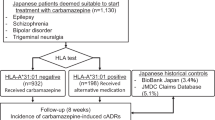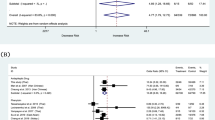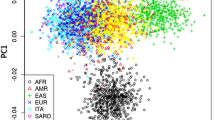Abstract
In an effort to prevent potentially fatal adverse reactions to carbamazepine, the US Food and Drug Administration (FDA) issued an alert in 2007 containing pharmacogenomic information, which is still in effect today. The alert states that carbamazepine-induced skin reactions are significantly more common in patients with the human leukocyte antigen (HLA)-B*1502 allele and that these people are almost exclusively from ‘broad areas of Asia, including South Asian Indians.’ This study reviews the medical evidence relied upon by the FDA and finds that the alert does not accurately reflect the medical evidence relied upon in 2007 or evidence that has been generated over the last 5 years since the label was created. The FDA drug labeling should be modified to reflect current medical evidence.
This is a preview of subscription content, access via your institution
Access options
Subscribe to this journal
Receive 6 print issues and online access
$259.00 per year
only $43.17 per issue
Buy this article
- Purchase on Springer Link
- Instant access to full article PDF
Prices may be subject to local taxes which are calculated during checkout




Similar content being viewed by others
References
US Food and Drug Administration, Information for Healthcare Professionals: Dangerous or Even Fatal Skin Reactions—Carbamazepine (marketed as Carbatrol, Equetro, Tegretol, and generics). 2007, available at http://www.fda.gov/Drugs/DrugSafety/PostmarketdrugsafetyinformationforPatientsandProviders/ucm124718.htm Accessed on 15 June 2012.
Payne PW Jr. . For Asians only? The perils of ancestry-based drug prescribing. J Law Med Ethics 2008; 36: 585–588.
Ganesan S, Hussain N . Should phenytoin and carbamazepine be avoided in Asian populations with the HLA-B*1502 positive genetic variant? Arch Dis Child 2011; 96: 104–106.
Yip V, Marson A, Jorgensen A, Pirmohamed M, Alfirevic A . HLA genotype and carbamazepine-induced cutaneous adverse drug reactions: a systematic review. Clin Pharmacol Ther 2012; 92: 757–765.
Chung W, Hung S, Hong H, Hsih M, Yang L, Ho H et al. Medical genetics: a marker for Stevens-Johnson syndrome. Nature 2004; 428: 486.
Hung S, Chung W, Jee S, Chen W, Chang Y, Lee W et al. Genetic susceptibility to carbamazepine-induced cutaneous adverse drug reactions. Pharmacogenet Genomics 2006; 16: 297–306.
Lonjou C, Thomas L, Borot N, Ledger N, de Toma C, LeLouet H et al. A marker for Stevens-Johnson syndrome: ethnicity matters. Pharmacogenomics J. 2006; 6: 265–268.
Man C, Kwan. P, Baum L, Yu E, Lau K, Cheng A et al. Association between HLA-B*1502 allele and antiepileptic drug-induced cutaneous reactions in Han Chinese. Epilepsia 2007; 48: 1015–1018.
Locharernkul C, Loplumlert J, Limotai C, Korkij W, Desudchit T, Tongkobpetch S et al. Carbamazepine and phenytoin induced Stevens-Johnson syndrome is associated with HLA-B*1502 allele in Thai population. Epilepsia 2008; 49: 2087–2091.
Tassaneeyakul W, Tiamkao S, Jantararoungtong T, Chen P, Lin S, Chen W et al. Association between HLA-B*1502 and carbamazepine-induced severe cutaneous adverse drug reactions in a Thai population. Epilepsia 2010; 51: 926–930.
Kulkantrakorn K, Tassaneeyakul W, Tiamkao S, Jantararoungtong T, Prabmechai N, Vannaprasaht S et al. HLA-B*1502 strongly predicts carbamazepine-induced Stevens-Johnson syndrome and toxic epidermal necrolysis in Thai patients with neuropathic pain. Pain Pract 2012; 12: 202–208.
Mehta T, Prajapati L, Mittal B, Joshi C, Sheth J, Patel D et al. Association of HLA-B*1502 allele and carbamazepine-induced Stevens-Johnson syndrome among Indians. Indian J Dermatol Venereol Leprol 2009; 75: 579–582.
Chang C, Too C, Murad S, Hussein S . Association of HLA-B*1502 allele with carbamazepine-induced toxic epidermal necrolysis and Stevens-Johnson syndrome in the multi-ethnic Malaysian population. Int J Dermatol 2011; 50: 221–224.
Wu X, Hu F, An D, Yan B, Jiang X, Kwan P et al. Association between carbamazepine-induced cutaneous adverse drug reactions and the HLA-B*1502 allele among patients in central China. Epilepsy Behav. 2010; 19: 405–408.
Zhang Y, Wang J, Zhao L, Peng W, Shen G, Xue L et al. Strong association between HLA-B*1502 and carbamazepine-induced Stevens-Johnson syndrome and toxic epidermal necrolysis in mainland Han Chinese patients. Eur J Clin Pharmacol 2011; 67: 885–887.
Wang Q, Zhou J, Zhou L, Chen Z, Fang Z, Chen S et al. Association between HLA-B*1502 allele and carbamazepine-induced severe cutaneous adverse reactions in Han people of southern China mainland. Seizure 2011; 20: 446–448.
Then S, Rani Z, Raymond A, Ratnaningrum S, Jamal R . Frequency of the HLA-B*1502 allele contributing to carbamazepine-induced hypersensitivity reactions in a cohort of Malaysian epilepsy patients. Asian Pac J Allergy Immunol 2011; 29: 290–293.
Shi Y, Min F, Qin B, Zou X, Liu X, Gao M et al. Association between HLA and Stevens-Johnson syndrome induced by carbamazepine in Southern Han Chinese: genetic markers besides B*1502? Basic Clin Pharmacol Toxicol 2012; 111: 58–64.
"Asia". Encyclopædia Britannica. Encyclopædia Britannica Online. Encyclopædia Britannica, 2012. Web. 26 Jun. 2012 http://www.britannica.com/EBchecked/topic/38479/Asia.
Central Intelligence Agency. CIA World Factbook, Welcome to the World Factbook, available at https://www.cia.gov/library/publications/the-world-factbook/wfbExt/region_eur.html Accessed on 15 June 2012.
Central Intelligence Agency. CIA World Factbook, East and Southeast Asia, available at https://www.cia.gov/library/publications/the-world-factbook/wfbExt/region_eas.html Accessed on 15 June 2012.
Central Intelligence Agency. CIA World Factbook, South Asia, available at https://www.cia.gov/library/publications/the-world-factbook/wfbExt/region_sas.html Accessed on 15 June 2012.
Central Intelligence Agency. CIA World Factbook, Central Asia, available at https://www.cia.gov/library/publications/the-world-factbook/wfbExt/region_cas.html Accessed on 15 June 2012.
Kaniwa N, Saito Y, Aihara M, Matsunaga K, Tohkin M, Kurose K et al. HLA-B locus in Japanese patients with anti-epileptics and allopurinol-related Stevens-Johnson syndrome and toxic epidermal necrolysis. Pharmacogenomics 2008; 9: 1617–1622.
Ikeda H, Takahashi Y, Yamazaki E, Fujiwara T, Kaniwa N, Saito Y et al. HLA class I markers in Japanese patients with carbamazepine induced cutaneous adverse reactions. Epilepsia 2010; 51: 297–300.
Kaniwa N, Saito Y, Aihara M, Matsunaga K, Tohkin M, Kurose K et al. HLA-B*1511 is a risk factor for carbamazepine-induced Stevens-Johnson syndrome and toxic epidermal necrolysis in Japanese patients. Epilepsia 2010; 51: 2461–2465.
Kashiwagi M, Aihara M, Takahashi Y, Muramatsu M, Ikezawa Z . HLA genotypes in carbamazepine induced severe cutaneous adverse drug response in Japanese patients. J Dermatol 2008; 35: 683–685.
Aihara M . Pharmacogenetics of cutaneous adverse drug reactions. J Dermatol 2011; 38: 246–254.
Kim S, Lee K, Song W, Kim S, Jee Y, Lee S et alAdverse Drug Reaction Research Group in Korea. Carbamazepine-induced severe cutaneous adverse reactions and HLA genotypes in Koreans. Epilepsy Res. 2011; 97: 190–197.
Alfirevic A, Jorgensen A, Williamson P, Chadwick D, Park B, Pirmohamed M . HLA-B locus in Caucasian patients with carbamazepine hypersensitivity. Pharmacogenomics 2006; 7: 813–818.
Tennis P, Stern R . Risk of serious cutaneous disorders after initiation of use of phenytoin, carbamazepine, or sodium valproate: a record linkage study. Neurology 1997; 49: 542–546.
Mockenhaupt M, Messenheimer J, Tennis P, Schlingmann J . Risk of Stevens-Johnson syndrome and toxic epidermal necrolysis in new users of antiepileptics. Neurology 2005; 64: 1134–1138.
Acknowledgements
The author’s work was supported by research support from the National Heart Lung and Blood Institute, National Institutes of Health, grant no. K12 K12HL090020-01.
Author information
Authors and Affiliations
Corresponding author
Ethics declarations
Competing interests
The author declares no conflict of interest.
Rights and permissions
About this article
Cite this article
Payne, P. Ancestry-based pharmacogenomics, adverse reactions and carbamazepine: is the FDA warning correct?. Pharmacogenomics J 14, 473–480 (2014). https://doi.org/10.1038/tpj.2014.14
Received:
Revised:
Accepted:
Published:
Issue Date:
DOI: https://doi.org/10.1038/tpj.2014.14
This article is cited by
-
Cross-ethnicity tagging SNPs for HLA alleles associated with adverse drug reaction
The Pharmacogenomics Journal (2019)
-
Health regulatory communications of well-established safety-related pharmacogenomics associations in six developed countries: an evaluation of alignment
The Pharmacogenomics Journal (2017)



